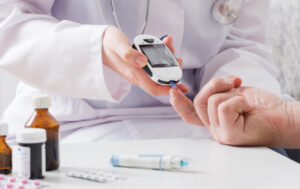
Diabetes Supplies and Devices
When you have diabetes, the most important thing you can do is keep your blood sugar levels under control. There are changes you have to make in order to do this and spending some time figuring out what devices and supplies you need to keep your disease in check is 100% necessary. Each device has a unique role to play in treating your diabetes and avoiding any complications.
Insulin, Insulin Syringes, and Insulin Pens
Your doctor will probably suggest you take insulin to keep your blood sugar levels from getting too high. As you may already know, insulin is a hormone your pancreas makes to help you use or store sugar from the foods you eat.
With type 1 diabetes, your pancreas does not make insulin and with type 2 diabetes, the pancreas makes insulin, but your body is not using it in the right way. There are 4 types of insulin that your doctor might recommend to you:
- Rapid-acting
- Regular or short-acting
- Intermediate-acting
- Long-acting
Each insulin works differently, for example, how long they take to start working, when they reach maximum strength, and how long they last. Your doctor will suggest injecting insulin 1-4 times a day depending on your body’s needs. You can inject insulin using a syringe and pulling insulin from a bottle or using an insulin pen (pre-filled or with an insertable cartridge).
Insulin Pumps
Insulin pumps are small devices connected to a catheter that is placed under the skin via a needle. It delivers small doses of insulin that are pre-programmed and vary throughout the day. There is a button on the pump which you can press when you eat meals with a larger content of carbohydrates, which then delivers a large dose of insulin into your body to break the carbohydrates down.
Blood Sugar Meters, Lancets, and Test Strips
Blood sugar meters (also known as a glucometer) is a portable device that measures your blood sugar level frequently throughout the day to make sure your blood sugar levels are not too high or too low. Your doctor will let you know when or how often you should be checking your blood sugar levels.
A lancet is an instrument that pricks your skin, to draw out a small drop of blood. The blood is then transferred onto a test strip and placed into the monitor. The monitor will display your blood sugar level on the screen. You can then log these results into a journal or your phone for safekeeping so you may discuss them with your doctor at a later date to make sure your treatment plan is working.
Ketone Testing
When your body does not have enough insulin to use sugar, it breaks down fat instead, making a substance called ketones. High ketone levels in your urine is a sign that your diabetes is out of control. When you have high ketone levels in your body, you can experience some tell-tale symptoms such as:
- Constant feelings of tiredness/sickness
- Excessive thirst or dry mouth
- Confusion
- Difficulty breathing
Sometimes your ketone levels will be tested at the doctor’s office, or you can use an at-home testing kit. Using an at-home ketone testing kit is simple. All you have to do is urinate into a cup and place the ketone test strip inside. Shake the excess urine and wait for the strip to change colour. There should be a colour chart in the ketone testing kit, so you can compare your strip and tell if your ketone levels are high or low.
Glucose Tablets/Glucagon
When you are first diagnosed with diabetes and you are figuring out how to manage blood sugar levels, it is not unusual for your blood sugar levels to fall low. If your blood sugars are low, it is important to get them back up quickly to avoid serious complications (e.g., seizures). A good way to quickly get your blood sugar levels back up is glucose tablets. They are fast-acting sugar pills you can take when you experience symptoms of hypoglycemia (e.g., confusion, headaches, dizziness, shakiness, racing pulse, etc.) or when your blood sugar is below 70mg/dL. They are small and compact so you can always have them on hand.
If you cannot take your glucose tablets on time, and you lose consciousness, someone will have to administer a shot of Glucagon, which is a hormone that tweaks your liver to release stored glucose into your bloodstream.




